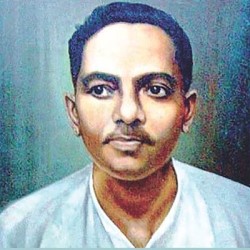
Jibanananda Das
| Date of Birth | : | 17 Feb, 1899 |
| Date of Death | : | 22 Oct, 1954 |
| Place of Birth | : | Barishal, Bangladesh |
| Profession | : | Bangladeshi Poet, Writer |
| Nationality | : | Bangladeshi |
Jibanananda Das is a Bengali poet, writer, novelist and essayist in the Bengali language. Popularly called "Rupashi Banglar Kabi'', Das is the most-read poet after Rabindranath Tagore and Kazi Nazrul Islam in Bangladesh and West Bengal.
Biography
Jibanananda's poems of rural Bengal played an important role in Bangladesh's political and cultural perspective. His poems inspired pride in Bengali nationhood, especially in the 1960s and during the war of liberation in 1971. Many of Jibanananda Das writings have been published posthumously. Some of the more well-known books are Jibanananda Daser Shreshtha Kavita (1954), Jibananander Kabyasombhar (1985), Prokashito Aprokashito Kavita Samagra (1993), Jibanananda Samagra (1985-1998), Jibanananda Samagra Songjojan (1999); collection: Aloprithivi(1981), Hey Prem Tomarey Bhebe Bhebe (1998). Kavitar Kotha (1955), a collection of his essays on poetry writing, is a valuable book. Another of his valuable books is Samalochana Samagra (1983 and 1986). An autobiographical essay by Keno Likhi was published in 1944. Two of Jibanananda Das'; well-known novels are Malyaban (1973) and Sutirtha (1977). The themes of these novels were unique and their writing style was special. Others edited his short stories and published first as Jibanananda Daser Galpa (1972) and later as Jibanananda Daser Sreshtha Galpa (1989). Between 1985 and 1998 Jibanananda Samagra was edited by Debesh Roy and published in 12 volumes in Calcutta by Pratikshan Publications. Banalata Sen received an award (1953) at the Nikhil Banga Rabindra Sahitya Sammelan (All Bengal Rabindra Literature Convention). Jibanananda Dasher Shrestha Kavita won the Sahitya Academy award in 1954. He died in a tram accident in Kolkata on 22 October, 1954.
Early Life
Jibanananda Das was born in 1899 in a Baidya family in the small district town of Barisal. His ancestors came from the Bikrampur (now Mushiganj) region of the Dhaka Division, from a now-extinct village called Gaupara in the kumarvog area of the Louhajang Upazila on the banks of the river Padma. Jibanananda's grandfather Sarbānanda Dāśagupta was the first to settle permanently in Barisal. He was an early exponent of the reformist Brahmo Samaj movement in Barisal and was highly regarded in town for his philanthropy. He erased the -gupta suffix from the family name, regarding it as a symbol of Vedic Brahmin excess, thus rendering the surname to Das. Jibanananda's father Satyānanda Dāś (1863–1942) was a schoolmaster, essayist, magazine publisher, and founder-editor of Brôhmobadi, a journal of the Brahmo Samaj dedicated to the exploration of social issues.
Death
Jibanananda’s life came to a sudden end by way of a road accident when he was only 55. On 14 October 1954, he was crossing a road near Calcutta's Deshapriya Park when he was hit by a tram. Jibanananda was returning home after his routine evening walk. At that time, he used to reside in a rented apartment on the Lansdowne Road. Seriously injured, he was taken to Shambhunath Pundit Hospital. Poet-writer Sajanikanta Das who had been one of his fiercest critics was tireless in his efforts to secure the best treatment for the poet. He even persuaded Dr. Bidhan Chandra Roy (then chief minister of West Bengal) to visit him in hospital. Nonetheless, the injury was too severe to redress. Jibanananda died in hospital on 22 October 1954 eight days later, at about midnight. He was then 55 and left behind his wife, Labanyaprabha Das, a son and a daughter, and the ever-growing band of readers
